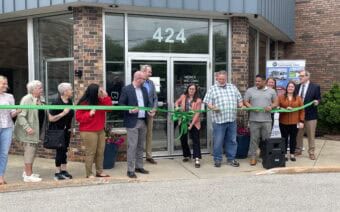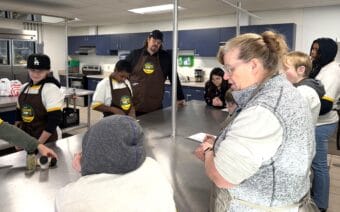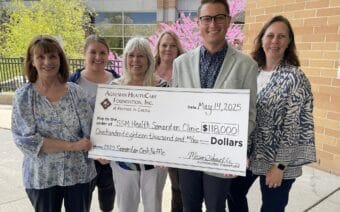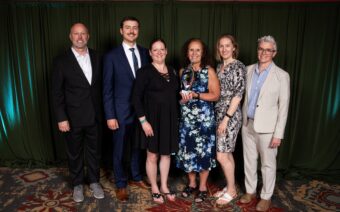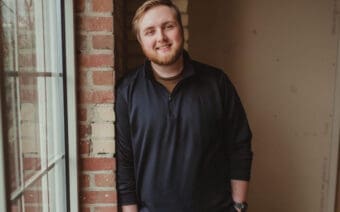
April 3, 2024
GREEN BAY — Last month, WACEP — the Wisconsin chapter of the American College of Emergency Physicians — announced this year’s winner of its Distinguished Service Award — Dr. Paul Casey of Bellin Health.
Casey said he’s been with Bellin since 2004, presently serving as a practicing emergency physician, medical director of the emergency department (ED) and medical director of utilization management.
The award, per WACEP, recognizes an emergency physician “who has demonstrated exceptional commitment and service to the organization, and/or made a significant contribution toward the advancement of emergency medicine in Wisconsin or beyond.”
Casey said he felt “honored and grateful” to receive the recognition.
“There’s nothing better than being appreciated by your peers,” he said. “To get an award from your peers solidifies everything you’ve been doing for the last 30-plus years has merit.”
The recognition, he said, came after he had already decided to retire from full-time practice this September.
“It’s the icing on the cake of a 38-year, satisfying, meaningful career,” he said. “I was not even aware of the award, and then I learned about it two weeks before I was to get it. It was a pleasant surprise and an honor — it topped everything off.”
Decades of service
His passionate career path, Casey said, can be traced back to his childhood in California.
“When I was five, I got a doctor kit for Christmas,” he said, “and I think that’s when I decided I was going to be a doctor.”
This dream, Casey said, though at odds with his blue-collar upbringing, persisted through high school.
And though he said his parents couldn’t afford to pay his college tuition, he was internally driven to realize his goal.
“I’m one of those type-A personalities — when I decide to do something, I’m going to do it,” he said. “I was going to go to med school, no matter what.”
Casey said he began his educational path by earning a bachelor’s degree in physiology from the University of California-Davis before taking a year off.
“I guess you’d call it a ‘gap year’ — that wasn’t a term back when I did it,” he said. “But I was tired of studying at the end of college and took a year off and worked as an EMT.”
Casey said that is probably one of the best things he has ever done.
“It did two things,” he said. “It reinforced my desire that I needed to stay the course, and it allowed me to enter medical school with a fresh mind, ready to put my nose to the grindstone.”
Casey said he applied to several schools during this time, ultimately gaining acceptance to the George Washington University School of Medicine and Health Sciences in Washington, D.C.
“Once you get into it, you don’t dare say, ‘well, it’s expensive — I’m not going to do it,'” he said. “You search for every opportunity to continue.”
The opportunity he sought, Casey said, was a scholarship called the Health Professional Scholarship Program.
He said the benefits of the scholarship include the military paying for medical school tuition, as well as providing recipients a living stipend.
In exchange, graduates serve in active duty — one year of service for each year funded by the scholarship.
“It’s a fairly competitive scholarship,” he said. “It was interesting because my roommate and I both applied, and I got it and he didn’t — so that created a little bit of tension where I lived.”
With finances settled, Casey said he could focus on two years of arduous studies followed by two years of clinical rotation shifts that required him to stay awake for 36 hours straight every three to four days.
“That’s against the law now because it’s not safe, but that’s the way we learned back then,” he said. “It was hard, but a lot of things are hard. You put your nose to the grindstone and carry on. There’s a saying in the army: ‘Suck it up and drive on.'”
Casey said he feels especially fortunate for the scholarship that funded his doctor of medicine degree and his residency — particularly because he presently knows graduates who owe hundreds of thousands of dollars in student loans.
“I came out of med school without a monetary debt, but it was a time debt,” he said. “Once I finished my emergency medicine residency, which I did in the army, I owed them four years of my life.”
However, Casey said he was more than a little surprised at how quickly and intensely he was called upon to uphold his half of the agreement.
“I didn’t sign up for the scholarship thinking I’d be deployed to a war,” he said, “but that happened immediately after I finished my training.”
Casey said a mere month after completing his residency, he was summoned to deploy on the first of “two lovely desert vacations” — Operation Desert Storm in 1990 and Somalia in 1992.
He said he compared the shock of deployment to that of Goldie Hawn’s protagonist in the 1980 film “Private Benjamin.”
“It was fairly frightening because Saddam Hussein had these warheads with chemical weapons on them,” he said. “They weren’t accurate, and they were fired every day. They were called scud missiles, and he would fire them in every direction. We would have to put on our chemical gear and get in a bunker, so it was quite a rude awakening.”
Though faced with challenges unlike any he’d faced as a civilian, Casey said, as a captain, he learned and internalized the true meaning of leadership — hard-earned wisdom he said he carries to this day.
“I learned to gain respect as a leader, you have to do a couple things,” he said. “You have to listen to your subordinates — you can’t assume you’re superior.”
An example of that, Casey said, was on the first night he arrived in Saudi Arabia.
“We were taken on a bus to this compound with tents with dirt on the floor, nothing else,” he said. “The first sergeant — who’s the highest-enlisting ranking person in the company — had two cots, and he asked the commander and myself if we wanted a cot. The commander said, ‘sure, I’ll have a cot.’ I said, ‘no, I’m not going to take it if the soldiers don’t get a cot.’ And that set the tone — the soldiers never respected the commander after that because he took advantage of his position and took something they couldn’t get. So that’s one of the first lessons I learned — don’t do something you wouldn’t ask your soldiers to do.”
The invaluable experience and wisdom, Casey said, wouldn’t be all he took away from his military service.
Though he said he had no interest in earning military decoration, he said he completed his service with three rows of ribbons and a Bronze Star Medal from Desert Storm.
Ultimately, he said, the scholarship proved to be a great decision.
“I only had to give up four years of my life to wear a uniform,” he said. “I would not change that. I don’t regret that one bit.”
A rewarding career
Casey said the transition to civilian life saw him working as an emergency physician in Seattle, working the night shift in an ED for three straight years.
Switching to the day shift, he said, entailed committee responsibilities he’d gladly avoided by working nights.
Though, Casey said he was surprised at how much he enjoyed serving as a department chair.
“That was the beginning of my administrative career,” he said. “I found it was a difficult intellectual challenge — trying to listen to different people and solving common problems we all dealt with, and being an advocate for my fellow physicians.”
Casey said the adage “the only reward for good work is more work” proved true as he was promoted to chief of staff of the facility, overseeing nearly 2,000 physicians.
Next, Casey said he was asked to serve on the board of directors for the “specialty society” for his field: the Washington chapter of the American College of Emergency Physicians.
As part of his work with the state’s ACEP, Casey said he sought to address what was a malpractice lawsuit crisis — efforts he said led to him becoming president-elect for the group in 2004.
He said “it was an honor to be elected as president,” though he never carried out his term because of a new job offer he received from a recruiter.
Though intrigued by the opportunity, Casey said he admits the job’s location was not immediately enticing.
“As a physician, you frequently get recruiting postcards (saying), ‘there’s a cool job here,’ but they don’t tell you exactly where it is,” he said. “So, I responded to this recruiting postcard, and I called them and they said, ‘oh, it’s Green Bay.’ I said, ‘where is Green Bay?'”
Though unfamiliar with Titletown at that point, Casey said the recruiter encouraged him not to say “no until you at least come out for an interview.”
“So, we came out, and I had an interview, and I was so impressed with Bellin, their philosophy, their track record in terms of quality and the opportunity they had,” he said.
That opportunity, Casey said, was a chance to direct what would be Bellin’s brand-new emergency department.
“It was like an ER doctor’s dream come true,” he said. “I was able to help design and have input into the layout of our ED and be involved in that, so it’s been an amazing 20-year career at Bellin.”
In the department he helped design, Casey said, he’s found his experiences tremendously rewarding.
“The thing that has been most meaningful to me in my long career in emergency medicine is having been allowed the privilege of forming brief, but meaningful human connections with patients and their families — often at times of personal crisis for them — (and) receiving words of appreciation for providing care and comfort,” he said.
Outside of emergency medicine, Casey said, his work in utilization management is “extremely gratifying.”
The role, he said, involves a constant “battle” with insurance companies to ensure Bellin, a not-for-profit hospital, is paid for the patient care it provides.
“It’s a different intellectual challenge trying to outsmart huge insurance companies,” he said. “I’m a passionate advocate for the underdog, so I like going to bat for the little guy.”
Casey said until his recent WACEP distinction, the highest honor bestowed on him by his peers was the 2017 VIP (Values in Practice) Award for “Individual Improve” from Bellin Health.
“I thrive on positive reinforcement, so if somebody tells me I’m doing a good job, or I receive an award, it’s an incentive to do more,” he said. “I’m a sentimental person, so things like this mean a lot to me — more than money.”
The 2017 award, Casey said, inspired him and validated all of the extra time he’d committed and the sacrifices he’d made by immersing himself in his practice.
Though he aspired to work as a physician past his retirement eligibility, Casey said he ultimately reevaluated this goal.
Following the COVID-19 pandemic, Casey said his industry, like so many others, continues to face staffing issues, leaving physicians overworked.
He said the resulting, regular stress in today’s EDs is unlike any he’s witnessed in his career.
Unfortunately, Casey said, this also corresponds with a sense of underappreciation from patients in recent years.
“That’s the thing that keeps most of us going — the gratification we get back from our patients, and unfortunately, the frequency that happens has gone way down the last five years,” he said. “Society has changed to the point where people aren’t as appreciative — they’re more demanding. It makes it harder to carry on.”
To avoid “empathy fatigue” setting in, Casey said he decided more than a year ago to retire as a physician this coming September.
He said, however, he will continue his utilization management work remotely.
Advising young physicians
With his career as a physician winding down, Casey said he has empathy for those who are newer to emergency departments — particularly because patient volume has tripled in the last 10 years.
“It’s gotten harder, but that’s not to say I would ever talk anybody into not going into medicine,” he said. “It’s still a noble, honorable profession.”
Casey said he has one primary piece of advice for medical workers of all ages.
“The main thing you have to do is get involved,” he said. “Get on a committee. Volunteer at the NEW Clinic. Do advocacy at the state level. There are a lot of things that come up legislatively — we can make a difference if we give input to our legislators.”
Finding the right place to work, Casey said, can be just as important.
“If you’re looking for a place to practice, make sure you select a place where physicians have a say and your input is valued,” he said. “I got that sense about Bellin when I first interviewed. But you have to ask people who work (at a facility) as fellow physicians.”
Casey said he looks back on his career with pride while looking forward to pursuing his efforts at utilization management.
“I’ve always been happy to take care of every patient whether I get paid for it because that’s my job,” he said. “I want to keep fighting.”
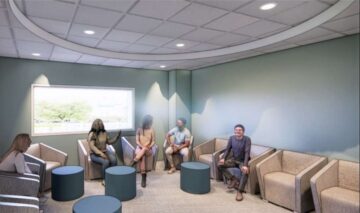 EmPATH unit to bridge behavioral healthcare gap in region
EmPATH unit to bridge behavioral healthcare gap in region We’ve really come a long way’ with cataract surgery techniques
We’ve really come a long way’ with cataract surgery techniques


